|
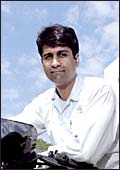 Bajaj
auto's Rajiv Bajaj, 37, needn't worry about being an underdog
in China. In what would be an irritating compliment to his company's
product development skills, Chinese auto companies are busy launching
imitation Bajaj vehicles. In January this year, some blasť Chinese
motorbike maker launched a knock-off of the dandy Bajaj Pulsar,
and most recently another firm has introduced an autorickshaw
that looks more than just inspired by Bajaj's famous workhorse.
"We are trying to locate the company that did this," fumes Bajaj.
It's unlikely that Bajaj will get justice in "counterfeitville",
but at least he now knows that his bikes are as good as those
of the Japanese. Bajaj
auto's Rajiv Bajaj, 37, needn't worry about being an underdog
in China. In what would be an irritating compliment to his company's
product development skills, Chinese auto companies are busy launching
imitation Bajaj vehicles. In January this year, some blasť Chinese
motorbike maker launched a knock-off of the dandy Bajaj Pulsar,
and most recently another firm has introduced an autorickshaw
that looks more than just inspired by Bajaj's famous workhorse.
"We are trying to locate the company that did this," fumes Bajaj.
It's unlikely that Bajaj will get justice in "counterfeitville",
but at least he now knows that his bikes are as good as those
of the Japanese.
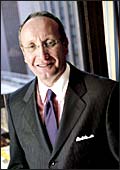 Realty's
Early Bird Realty's
Early Bird
Perhaps
because Bruce E. Mosler loves deep-sea fishing, the global
CEO of real estate firm Cushman & Wakefield decided to wager on
India way back in 1997. Today, the New York-based Mosler can't
stop grinning. His India business is clipping, reporting a 75
per cent jump in revenues last year. But Mosler, 47, thinks this
is just the beginning for Indian realty: "We expect $100 billion
(Rs 4,50,000 crore) to flow into Indian real estate over the next
10 years," he says. If India's overheated real estate market ever
needed a champion, Mosler would be a shoo-in candidate.
Unlocking
Riches
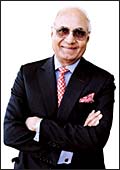 The
man who turned Delhi's barren suburb, Gurgaon, into one of the
most happening cities in India is set to strike pay dirt all over
again. His real estate company DLF Universal, where K.P. Singh
and his family own 99.5 per cent of the shares, is planning
an IPO (initial public offering), and investment bankers have
valued it between $20 billion (Rs 90,000 crore) and $25 billion
(Rs 1,12,500 crore). Depending on which, the float should make
Singh the richest or the second richest Indian, after Mittal Steel's
L.N. Mittal, who is #5 on Forbes' billionaire list with a net
worth of $23.5 billion (Rs 1,05,750 crore). The
man who turned Delhi's barren suburb, Gurgaon, into one of the
most happening cities in India is set to strike pay dirt all over
again. His real estate company DLF Universal, where K.P. Singh
and his family own 99.5 per cent of the shares, is planning
an IPO (initial public offering), and investment bankers have
valued it between $20 billion (Rs 90,000 crore) and $25 billion
(Rs 1,12,500 crore). Depending on which, the float should make
Singh the richest or the second richest Indian, after Mittal Steel's
L.N. Mittal, who is #5 on Forbes' billionaire list with a net
worth of $23.5 billion (Rs 1,05,750 crore).
 The
India Connection The
India Connection
Dr
Wolfgang Niedermaier couldn't tell
a Googly if he saw one, but he sure can spot a good partner when
he sees one. That's how the 54-year-old CEO of Germany's generic
drug maker betapharm found his wife in India 33 years ago (Gunhild,
also a student of medicine from the University of Kiel like Niedermaier,
charmed him on a study tour to India) and more recently a strategic
partner for his company in Hyderabad-based Dr Reddy's Labs, which
impressed him by its genuine desire to understand the work being
done at betapharm. "When you acquire or sell a company, there
are a lot more things involved that go beyond technology and profitability,"
said the full marathoner and father of three on a recent visit
to Dr Reddy's. By the way, he's still married to Gunhild.
Transcontinental Move
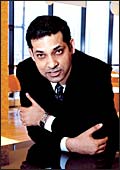 Another
hi-profile executive has succumbed to the private equity fever.
This time, it is Rajiv Kaul, 37, former Managing Director
of Microsoft India, who moved to the headquarters in Redmond as
recently as April 2005. He is joining private equity firm Actis
in London as a partner. Says Kaul: "I will be specifically looking
after technology...and India and China will be a key focus area."
He says there were also some offers from multinational companies
to head their India operations, but he turned them down because
"I've been there, done that". So, will turning an entrepreneur
himself be the next career move for this XLRI grad? "Not just
now, but never say never," he says. We'll take that as a yes,
then. Another
hi-profile executive has succumbed to the private equity fever.
This time, it is Rajiv Kaul, 37, former Managing Director
of Microsoft India, who moved to the headquarters in Redmond as
recently as April 2005. He is joining private equity firm Actis
in London as a partner. Says Kaul: "I will be specifically looking
after technology...and India and China will be a key focus area."
He says there were also some offers from multinational companies
to head their India operations, but he turned them down because
"I've been there, done that". So, will turning an entrepreneur
himself be the next career move for this XLRI grad? "Not just
now, but never say never," he says. We'll take that as a yes,
then.
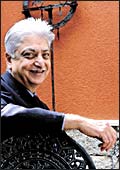 A
Deal With A Doctor A
Deal With A Doctor
Wipro's
chairman Azim Premji, 61, knows the value of money. That's
why despite being the second richest Indian in the world with
a wealth of $11 billion or Rs 49,500 crore (Forbes), he doesn't
believe in throwing money around. So if anyone doubted that Narayana
Hrudayalaya founder Dr Devi Shetty ran one of the best heart hospitals
in the subcontinent, Premji's proposed investment in it should
settle the matter. Premji's money manager Mrunmay Das declined
to comment, but a hospital source says a deal is likely by the
end of this month.
Native Interest
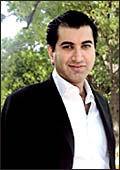 Bundeep
Singh Rangar, 36, chairman of Indusview Advisors, an India-focussed
corporate advisory firm, has done just about everything. The London-based,
India-born has been a journalist (at Bloomberg), a live TV host
for a show on the internet (in Europe), and an entrepreneur-in-residence
(at Jacob Rothschild and Maurice Saatchi-backed Saffron Hill Ventures).
But Rangar thinks there are higher mountains to be climbed. "I
am restless to do and build...the challenge is to build a world-class
$1 billion company in three to five years," he says. For Rangar,
India today may be the perfect place to try to do that. Bundeep
Singh Rangar, 36, chairman of Indusview Advisors, an India-focussed
corporate advisory firm, has done just about everything. The London-based,
India-born has been a journalist (at Bloomberg), a live TV host
for a show on the internet (in Europe), and an entrepreneur-in-residence
(at Jacob Rothschild and Maurice Saatchi-backed Saffron Hill Ventures).
But Rangar thinks there are higher mountains to be climbed. "I
am restless to do and build...the challenge is to build a world-class
$1 billion company in three to five years," he says. For Rangar,
India today may be the perfect place to try to do that.
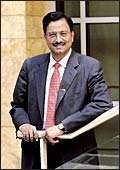 The
New Man At Nasscom The
New Man At Nasscom
Call it a double bonus
for B. Ramalinga Raju. Not only is 50-year-old Raju's IT
company, Satyam Computer Services, likely to announce $1 billion
(Rs 4,500 crore) in revenues for the financial year just ended,
but Raju has also been elected as the Chairman of the industry
lobby, Nasscom. Hyderabad-based Raju, who'll now be spending more
time in Delhi, says that apart from pushing for policy changes,
his priority will be to develop physical infrastructure (in terms
of better roads and airports) at the national level and create
an ecosystem more conducive to the it sector. "The focus
will have to be on innovation as the key driver for taking some
member companies to the next level," says Raju. That will
be crucial to ensure more billion-dollar hits in the industry.
-Contributed by Kushan Mitra, Shalini
S. Dagar, Shaleen Agrawal, E. Kumar Sharma and Rahul Sachitanand
|




 B
B Realty's
Early Bird
Realty's
Early Bird  T
T The
India Connection
The
India Connection A
A A
Deal With A Doctor
A
Deal With A Doctor B
B The
New Man At Nasscom
The
New Man At Nasscom